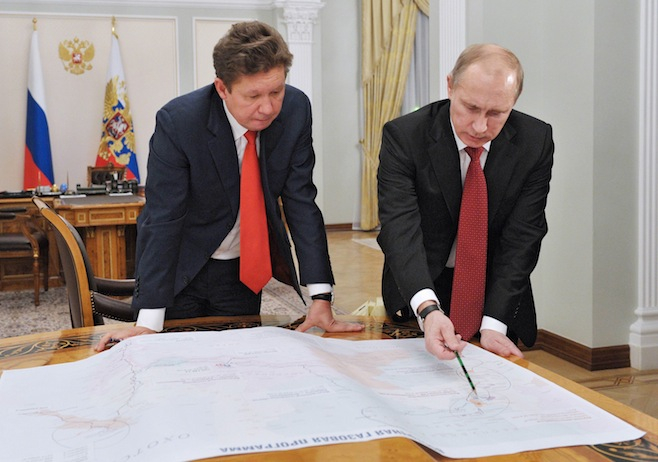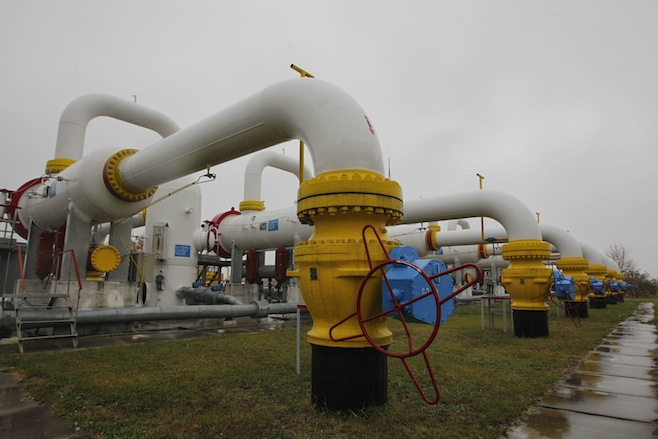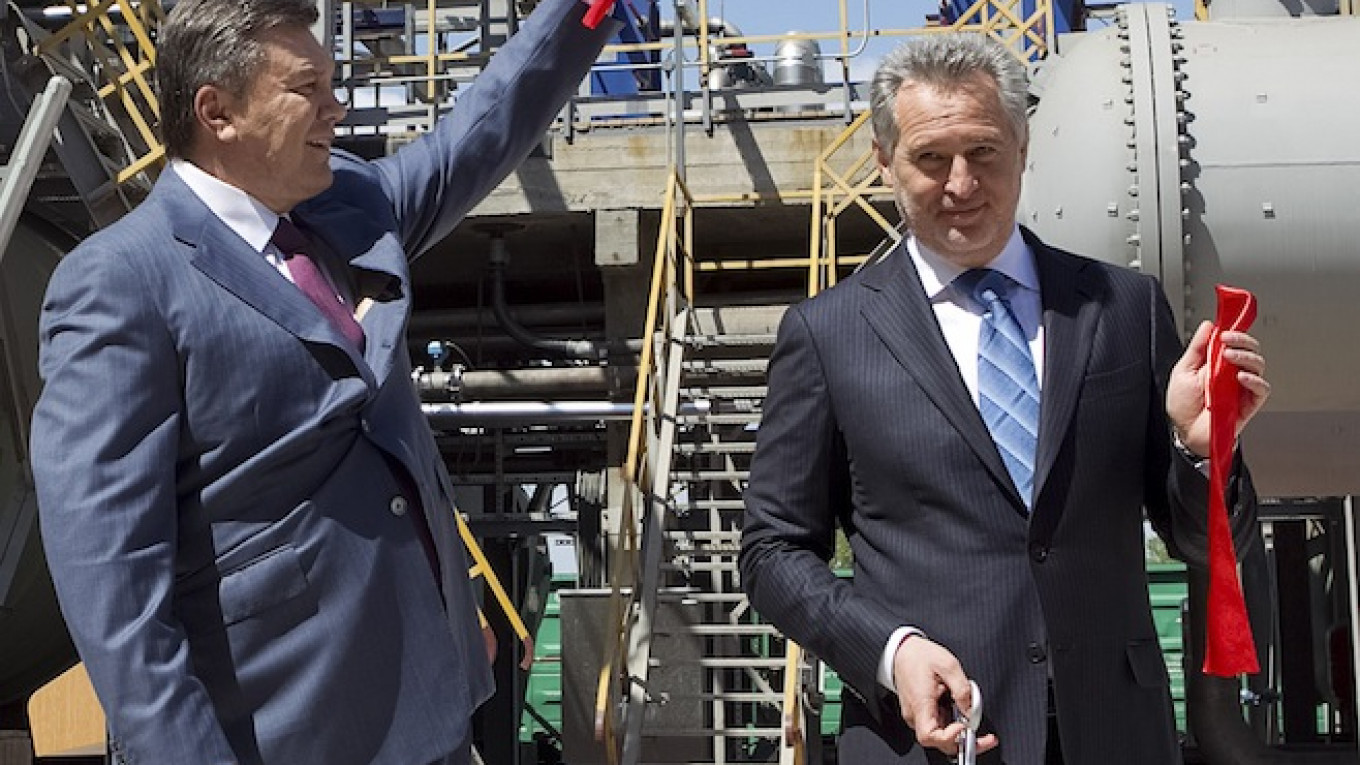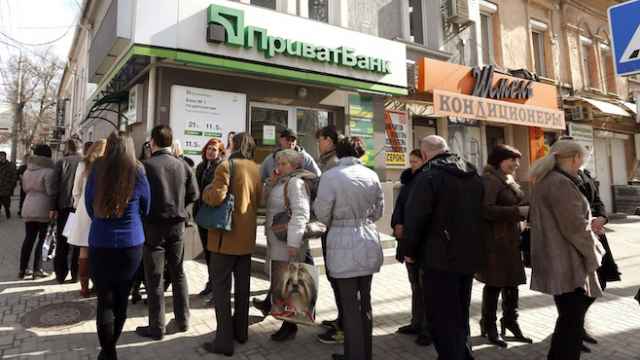In Russia, powerful friends helped him make a fortune. In the United States, officials want him extradited and put behind bars. In Austria, where he is currently free on bail of $155 million, authorities have yet to decide what to do with him.
He is Dmitry Firtash, a former fireman and soldier. In little more than a decade, the Ukrainian went from obscurity to wealth and renown, largely by buying gas from Russia and selling it in his home country. His success was built on remarkable sweetheart deals brokered by associates of Russian leader Vladimir Putin, at immense cost to Russian taxpayers, an investigation shows.
Russian government records reviewed for this article reveal for the first time the terms of recent deals between Firtash and Gazprom, a giant gas company majority owned by the state.
According to Russian customs documents detailing the trades, Gazprom sold more than 20 billion cubic meters of gas well below market prices to Firtash over the past four years — about four times more than the Russian government has publicly acknowledged. The price Firtash paid was so low that companies he controlled made more than $3 billion on the arrangement.
Over the same time period, other documents show, bankers close to Putin granted Firtash credit lines of up to $11 billion. That credit helped Firtash, who backed pro-Russian Viktor Yanukovych's successful 2010 bid to become Ukraine's president, to buy a dominant position in the country's chemical and fertilizer industry and expand his influence.
The Firtash story is more than one man's grab for riches. It demonstrates how Putin uses Russian state assets to create streams of cash for political allies, and how he exported this model to Ukraine in an attempt to dominate his neighbor, which he sees as vital to Russia's strategic interests. With the help of Firtash, Yanukovych won power and went on to rule Ukraine for four years. The relationship had great geopolitical value for Putin: Yanukovych ended up steering the nation of more than 44 million away from the West's orbit and towards Moscow's until he was overthrown in February.
"Firtash has always been an intermediary," said Viktor Chumak, chairman of the anti-corruption committee in the previous Ukrainian parliament. "He is a political person representing Russia's interests in Ukraine."
A spokesman for Putin rejected claims that Firtash acted on behalf of Russia. "Firtash is an independent businessman and he pursues his own interests, I don't believe he represents anyone else's interests," said Dmitry Peskov.
The findings are the latest in a Reuters examination of how elites favored by the Kremlin profit from the state in the Putin era. In the wild years after the fall of the Soviet Union, state assets were seized or bought cheaply by the well connected. Today, resources and cash flows from public enterprises are diverted to private individuals with links to Putin, whether in Russia or abroad.
Putin's system of comrade capitalism has had huge costs for the ordinary people of Russia: By granting special cheap deals to Firtash, Gazprom missed out on about $2 billion in revenue it could have made by selling that gas at market prices, according to European gas price data. Four industry analysts said that Gazprom could have sold the gas at substantially higher prices to other customers in Europe.
At the same time, the citizens of both Russia and Ukraine have seen unelected oligarchs wield political influence.
Firtash, whose main company, Group DF, describes him as one of Ukraine's leading entrepreneurs and philanthropists, was arrested in Austria on March 12 at the request of U.S. authorities. The Americans accuse him of bribery over a business deal in India unrelated to events examined in this article. Firtash denies those allegations and is currently free on bail.
Firtash imported the cheap Russian gas through a Cypriot company of which he is sole director, and a Swiss one set up by Group DF. He and Group DF declined to answer questions about those two companies and their gas dealings. A spokesman said Firtash was not available to discuss his business operations, and that Group DF did not wish to comment on "any of the questions you put forth."
The Kremlin spokesman Peskov said Putin has met Firtash but that they are not close acquaintances. He said Russia supplied gas at "lower prices" to Ukraine because Yanukovych had asked for it and Russia wanted to help Ukraine's petrochemical industry. Peskov said the deals were arranged through Firtash because "the Ukrainian government asked for it to be that way."
Yanukovych, who fled to Russia in February after mass demonstrations against his government, could not be reached for comment.

Russia's President Vladimir Putin (R) meets with Gazprom's Chief Executive Alexei Miller at the Novo-Ogaryovo residence outside Moscow on Oct. 29, 2012.
The Middleman
From the moment he first became Russia's president, Putin moved to take control of his country's most valuable resource: natural gas. After assuming power in 2000, he replaced the management of Gazprom, put trusted allies in charge, and ensured the Russian state controlled more than half the shares.
The corporate behemoth now supplies about a third of Europe's gas, generating vital revenue for Russia and giving Putin a powerful economic lever. "Gazprom is very much a tool of Russian foreign policy," says Rem Korteweg, senior research fellow at the Center for European Reform. Every major deal that Gazprom signs is approved by Putin, people in the energy industry say.
Putin's spokesman rejected such assertions: Gazprom, he said, "is a commercial, public company, which has international shareholders. It acts in the interests of its shareholders, which also include the Russian state."
In normal times, Gazprom's second biggest customer in Europe is Ukraine; Russian gas was piped directly across the border between the two countries until Russia cut off supplies earlier this year.
In the 2000s, though, Gazprom decided to sell gas not directly to Ukraine's state gas company Naftogaz, but to intermediaries — in particular Firtash, an international gas dealer who had risen from humble origins.
Firtash grew up in west Ukraine, where his father worked in education and his mother in a sugar factory, according to an account Firtash gave during a meeting with the U.S. ambassador in Kiev in 2008. Both his parents disdained communism and lacked the contacts needed to get their son into university, he said.
He joined the army in 1986, then trained to be a fireman. When the Soviet Union collapsed, leading to Ukraine's independence in 1991, Firtash found himself having to make a living in an uncertain world, according to his account to the ambassador. With his first wife, he set up a business in west Ukraine shipping canned goods to Uzbekistan, according to local media reports researched by the U.S. embassy.
A U.S. diplomatic cable, which summarised Firtash's discussion with the ambassador, drily noted: "Due to his commodities business, [Firtash] became acquainted with several powerful business figures from the former Soviet Union."
According to the cable, Firtash told the U.S. ambassador he had been forced to deal with suspected criminals because at that time it was impossible to do business in Ukraine cleanly. He said he had needed and received permission from a man named Semion Mogilevich to establish various businesses. Mogilevich, an alleged boss of organized crime in eastern Europe, is wanted by the U.S. Federal Bureau of Investigation for an alleged multimillion-dollar fraud in the 1990s involving a company headquartered in the United States. He was indicted in 2003, and described by the FBI in 2009 as having an "extensive international criminal network."
Firtash has repeatedly denied having any close relationship with Mogilevich. Mogilevich could not be contacted for comment. He has previously denied any wrongdoing or any connection to the gas trade in Ukraine.
By 2002, a company called Eural Trans Gas, registered in Hungary, was transporting gas from Turkmenistan through Russia to Ukraine. Its ownership was unclear, but Firtash represented it. In July 2004, a new company, RosUkrEnergo, became the intermediary for gas deals between Russia and Ukraine. The owners of RUE were unknown at first, but it later emerged that nearly all of the company was owned by Firtash and Gazprom.
RUE bought gas cheaply and sold it on at a higher price in Ukraine and Europe. This arrangement guaranteed profits for RUE and was hugely controversial among Ukrainians who saw RUE as an unnecessary intermediary. Another U.S. diplomatic cable, from March 2009, described RUE as a "cash cow" and a "serious source of ... political patronage." In a website posting, RUE said that in 2007 it sold nearly $10 billion worth of gas and had net income of $795 million.
After Yulia Tymoshenko, herself a former gas trader, became prime minister of Ukraine in 2008, she reacted to public anger about the gas trade and moved to cut Firtash and RUE out of the business. She struck her own gas deal with Putin in 2009.
By that time, Firtash was rich. In the country's 2010 presidential election, Firtash, by his own admission, aided the pro-Russian Yanukovych. A U.S. diplomatic cable described Firtash as a "major financial backer" of Yanukovych.
"Firtash supported Yanukovych in various ways," said Vadym Karasiov, an aide to Viktor Yuschenko, Ukraine's president from 2005 to 2010, in an interview. Karasiov said the mogul used his influence in the media to promote Yanukovych. In April 2010, in the aftermath of the election, Karasiov told the Kiev Post: "Without Dmitry Firtash there wouldn't have been a [Yanukovych] victory."
With Yanukovych president, Tymoshenko stepped down as prime minister. Business associates of Firtash were appointed to influential positions in the new administration. He had allies in the corridors of power, and ambitious plans to expand his business empire and get back into the gas trade. His friends in Russia were happy to help him.
The Loans
Tucked away in Nicosia, Cyprus, a bundle of tattered papers wrapped in string records Russian credit agreements made to Firtash companies. The documents, detail a series of financing deals worth billions of dollars.
The deals were arranged by a Russian lender called Gazprombank. Despite its name, the bank is not controlled by Gazprom, which holds only a minority stake. It is a separate business, overseen by people linked to Putin. They include Yuri Kovalchuk, a banker who until March 2014 controlled an investment firm that manages a majority stake in Gazprombank.
In a statement, Gazprombank said: "We do not receive any instructions from the Kremlin ... The strategy of the bank is developed by its management board and approved by the board of directors. No other influence is possible."
Asked whether Putin had any role in issuing the loans to Firtash companies, Kremlin spokesman Peskov said: "Putin, as president, does not have anything to do with this."
Gazprombank began lending money to Firtash companies soon after Yanukovych took power in Ukraine in February 2010.
In June that year, Firtash established a company called Ostchem Investments in Cyprus. A month later, Gazprombank registered a credit line to the company of $815 million, according to the Cyprus documents. In September, Ostchem Investments bought a 90 percent stake in the Stirol fertiliser plant in Ukraine. It was perfect synergy: Firtash knew the gas business, and natural gas is a major feedstock for making fertilizer.
Further loans and deals with Firtash companies followed.
By March 2011, Gazprombank had registered credit lines of up to $11.15 billion to Firtash companies. The companies may not have borrowed that whole sum, but the documents indicate that loans up to that amount were available, according to Cyprus lawyers.
In the space of seven months in 2011 alone, Firtash acquired control of two more fertilizer plants in Ukraine, Severodonetsk Azot and Rivne Azot. He also bought the Nika Tera sea port, through which fertilizer and other dry bulk goods are shipped. He acquired a lender called Nadra Bank and invested in the titanium processing industry.
Such was his expansion that Firtash became the fifth largest fertilizer producer in Europe. Being a large employer brought not just potential profits but also political clout, he boasted. "We have relations with MPs," Firtash told Die Presse in Austria in May. "We are big employers in the regions that they represent. Entire cities live on our factories. Election candidates seek our support."
When asked in 2011 where the money came from to pay for his acquisitions, Firtash was coy. At a press conference called to announce his purchase of the Severdonetsk plant, he declined to name his major lenders. "It's a secret," he told Ukrainian journalists.
But a Gazprombank manager said the Russian bank had led a consortium of lenders which in 2011 agreed to lend about $7 billion to Firtash. The official said Gazprombank itself lent Firtash $2.2 billion, and that Firtash still owed the bank $2.08 billion. The official declined to name other lenders in the consortium.
A $2.2 billion loan was a big commitment for Gazprombank: It amounted to nearly a quarter of the bank's total capital, the maximum loan allowed by Russian banking rules for any single client or group. Based on regulatory filings, the loan facility made Firtash the biggest single borrower from Gazprombank.
It is unclear how much in total the Gazprombank consortium lent to Firtash companies.
In a statement, Gazprombank said that "the aggregate amount of loans disbursed to Ostchem Group" was "several times lower" than $11 billion. "And all capital requirements and limitations of the Central Bank of Russia in respect of loans granted have always been complied with by Gazprombank, including loans to Ostchem Group," the statement said.
The bank declined to give any further details, saying it had to protect client confidentiality. The Central Bank had no comment.

Gas cleaning system pipes are pictured at Romny gas compressor station in Sumy region, Ukraine, on Oct. 16, 2014.
Gas Profits
Firtash now had money, political connections and businesses that relied on large supplies of gas. What he needed next was fuel.
In January 2011, Firtash signed an unpublished agreement with Gazprom to buy gas through a company called Ostchem Holding in Cyprus, where he is the sole director listed.
The gas deal was later extended to include sales to Ostchem Gas Trading AG in Switzerland. It was also agreed by Naftogaz, Ukraine's state-owned gas firm, where Yanukovych had installed new senior management. Firtash needed Naftogaz's sign-off because it controlled pipelines delivering gas and, until that point, had an exclusive deal to import gas from Gazprom.
Naftogaz's decision to agree to the deal was an odd one. Not only did it mean Naftogaz would surrender its monopoly on Russian gas imports, but the deal could also potentially damage the state firm. Naftogaz had previously agreed with Gazprom to pay for a set amount of gas whether it could sell it in Ukraine or not. Firtash's deal could leave the Ukrainian state firm buying gas it would struggle to sell.
Firtash's return to importing gas became public knowledge after Yanukovych's election victory. But the price he paid Moscow, and how much cheap gas he bought, remained unclear. An Ostchem spokesman said the price was "confidential information."
Russian customs records show that in 2012, Moscow sold the gas to Firtash for $230 per 1,000 cubic meters (the standard unit used in gas sales). In 2013 the average cost was $267 per unit. Those prices were at least one-third less than those paid by Ukraine's Naftogaz.
Ukrainian customs documents and corporate filings show that Firtash's Ostchem companies in Cyprus and Switzerland resold the gas to his chemical plants in Ukraine for $430 per unit. The prices and volumes suggest that the two offshore Ostchem companies made an operating profit of approximately $3.7 billion in two years.
Naftogaz's current management is highly critical of the way in which Gazprom favored Firtash's companies. Aliona Osmolovska, chief of press relations, said: "These special deals for Ostchem were not in the interest of Ukraine."
The real loser in the deal, though, was Gazprom. The arrangement, which Putin described during a press conference as having been made with the "input of the Russian leadership," meant Russia sold its gas to Firtash for at least $100 per unit less than it could have made in Western Europe, according to Emily Stromquist, head of Russian energy analysis at Eurasia Group, a political risk research firm.
In addition, the profits from the subsequent resale of the gas were all reaped offshore by companies that did not benefit the Russian taxpayer. Those profits in 2012 and 2013 would have meant an additional $2 billion for Gazprom, whose ultimate majority owners are Russia's citizens.
Gazprom declined to comment on its sales to Firtash's companies.
Putin's spokesman Peskov said Naftogaz agreed to Firtash receiving gas at low prices because the deal was intended to help Ukraine's petrochemical industry. Asked why the gas was sold to companies in Cyprus and Switzerland, Peskov said: "Putin doesn't need to approve this action. These operations are technical and were made by Gazprom according to the structures which are always used by its Ukrainian partners."
Neither of the two Firtash companies that bought gas from Russia publishes accounts. Firtash declined to comment on the firms or their results.
Uneasy Standoff
The new government in Ukraine alleges that Yanukovych had allowed corruption to flourish and stolen millions of dollars. In the longer term, the new government says it wants to forge closer ties with the European Union and reduce its dependence on Russian gas.
In June, Moscow cut off supplies of gas to Kiev, claiming that it was owed billions of dollars by Ukraine's state-owned Naftogaz. Late last month, the two countries struck a deal allowing supplies to resume, but the agreement runs only until March. Firtash retains large stocks of gas but has not imported new supplies since Yanukovych was ousted.
Firtash remains in Austria awaiting the outcome of extradition hearings. According to a U.S. indictment unsealed in April, he is suspected of a scheme to bribe Indian government officials to procure titanium. Two U.S. government officials said the American investigation into Firtash is continuing; they declined to give further details.
The Ukrainian oligarch has said the allegations are "without foundation" and has accused Washington of acting for "purely political reasons." He has hired an all-star legal defense team. It includes Lanny Davis, who helped President Bill Clinton weather a series of White House scandals in the 1990s.
In his time of trouble Firtash has not been deserted by the Russians. Since his arrest he has received another loan in order to pay his bail: $155 million from Vasily Anisimov, the billionaire who heads the Russian Judo Federation, the governing body in Russia of Putin's beloved sport.
"I have known Mr. Firtash for a number of years, though he is neither my friend nor business partner," Anisimov said in an email. "I confirm that I loaned 125 million euros to him. This was a purely business transaction."
A Message from The Moscow Times:
Dear readers,
We are facing unprecedented challenges. Russia's Prosecutor General's Office has designated The Moscow Times as an "undesirable" organization, criminalizing our work and putting our staff at risk of prosecution. This follows our earlier unjust labeling as a "foreign agent."
These actions are direct attempts to silence independent journalism in Russia. The authorities claim our work "discredits the decisions of the Russian leadership." We see things differently: we strive to provide accurate, unbiased reporting on Russia.
We, the journalists of The Moscow Times, refuse to be silenced. But to continue our work, we need your help.
Your support, no matter how small, makes a world of difference. If you can, please support us monthly starting from just $2. It's quick to set up, and every contribution makes a significant impact.
By supporting The Moscow Times, you're defending open, independent journalism in the face of repression. Thank you for standing with us.
Remind me later.






